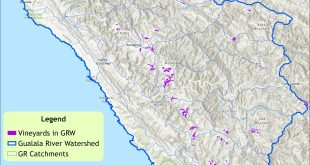| by Peter Fimrite June 14, 2013 San Francisco Chronicle |
[excerpt:]
A giant redwood forest in Sonoma County that was on the verge of being divvied up and plowed over into a patchwork of vineyards has been preserved by a public-private partnership that engineered what is being touted as the largest land conservation deal in California history.
. . .
“It was a nightmare project for this property,” said Chris Poehlmann, who spearheaded a campaign on behalf of Friends of the Gualala River that went viral, collecting 91,000 signatures from around the world on a petition protesting the proposed development.
Protesters marched with banners and Poehlmann dressed up in an 8-foot-tall wine bottle costume to ridicule Premier Pacific as pushing “Chainsaw Wine” and “Pino[t] Egregio.”
. . .
| To read the entire article, visit the SF Chronicle: Preservation Ranch saved in record deal. Also on SFGate: |
For additional information, see:
 Preservation Ranch Acquisition
Preservation Ranch Acquisition
Coastal Conservancy staff recommend that the Conservancy authorize the disbursement of up to $10,000,000 to The Conservation Fund to acquire the property known as “Preservation Ranch.”
 $24.5 million deal to protect
$24.5 million deal to protect
20,000-acre Sonoma County forest
A national conservation group has reached an agreement to buy nearly 20,000 acres of timberland in northwestern Sonoma County, a move that derails the long-disputed, forest-to-vineyards conversion project pushed by CalPERS, the giant state workers pension fund. February 26, 2013, Santa Rosa Press Democrat
“Preservation” Ranch
 The so-called “Preservation” Ranch is a 19,300 acre development in the heart of the Gualala River watershed. Premier Pacific Vineyards plans to destroy and fragment coastal redwood forest to plant grapes on the ridgetops – and call that “preservation.”
The so-called “Preservation” Ranch is a 19,300 acre development in the heart of the Gualala River watershed. Premier Pacific Vineyards plans to destroy and fragment coastal redwood forest to plant grapes on the ridgetops – and call that “preservation.”
Artesa Sonoma forest-to-vineyard conversion
 CAL FIRE has approved the Environmental Impact Report (EIR) for Artesa Winery’s controversial plan to clear-cut 154 acres of coastal redwood forest to plant a vineyard in Annapolis. The EIR claims that the project will have no significant environmental or cultural impacts.
CAL FIRE has approved the Environmental Impact Report (EIR) for Artesa Winery’s controversial plan to clear-cut 154 acres of coastal redwood forest to plant a vineyard in Annapolis. The EIR claims that the project will have no significant environmental or cultural impacts.
 Friends of Gualala River Protecting the Gualala River watershed and the species living within it
Friends of Gualala River Protecting the Gualala River watershed and the species living within it


